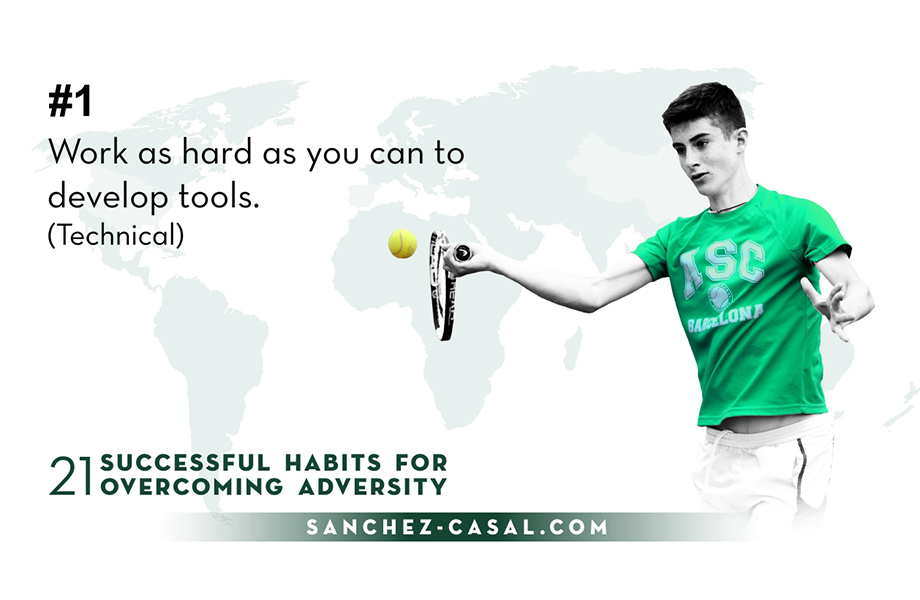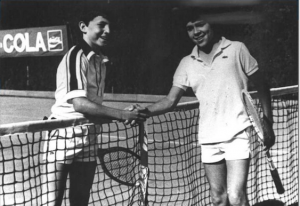
By Emilio Sánchez Vicario, CEO and Founder at Academia Sánchez-Casal
#1 Work as hard as you can to develop tools (Technical)
In an ideal world competition should not exist, but in the world where we live, it is a key component. Since we were born, our parents have compared us to our siblings, to our cousins, our classmates, our friends, or to the children of their friends. We all grow up competing, and this can be so stressful that some kids can’t handle it. In school it is with grades, in life it is in relationships, and in work it is with our colleagues, and all this competition is very tiring.
There are people who deal with it better, and others who struggle. It is abundantly clear, however, that those who have played sports since they were kids have a unique advantage. They are used to finding solutions when things get tough, thanks to their athletic experiences.
The idea for this article came about in response to an open question posed to our Linkedin group, Tennis Worldwide Leadership. Jorge Zuazola, my mentor in Digital 3.0, asked me to write 21 Successful Habits for Overcoming Adversity, and I had to dig deep inside, examining my tennis background in detail in order to write about my habits coherently. Today, I am proud to release the 21 habits with the launch of our new Blog on the website.
When I teach coaching courses through our International Coaches Institute, we always talk about the four Pillars of Tennis: Technical, Tactical, Physical and Mental. It’s important to note that adversity can attack any of the pillars, in any number of ways, and with a multitude of possible consequences.

When adversity attacks the Technical Pillar (which is comprised of our tools: serve, volley, footwork, etc) this is a major problem because it causes a crack in the foundation of the building. For example, if our serve is a work in progress and has not yet been consolidated, we will most likely revert to old techniques when we are under tournament pressure. This leads to a loss of the competitive state, knocking us out of the match on that day.
When adversity attacks the Tactical Pillar (knowing which tools to use and when), we struggle to organize our tools, and we don’t know which tool to use in which moment. As a result, we lose competitiveness and the outcome is unfavorable.
The Physical Pillar is key in today’s world, as good health allows us to live better, and in sports it permits us to compete for longer. If we rest, work, eat, and hydrate well, we can do the things we do well for longer and we become survivors. On the other hard, if we don’t rest, don’t eat, or don’t drink enough, we run out of fuel and can no longer compete effectively.
But the pillar that is most bombarded by adversity is the Mental one. Any negative emotion, loss of control, or those things that we cannot see but that attack the Mental Pillar can take down all three remaining pillars immediately. If we cannot stay calm, keep focused, maintain our drive and passion, then we cannot use our tools (Technical), we cannot organize them (Tactical), and it doesn’t matter how much pressure our bodies can resist (Physical), because the mind is the boss and ultimately it determines whether we can compete successfully or not.
In order to compete, our mind must face its strongest rival: Adversity. These 21 habits follow a logical order, but they are so powerful that they can each stand on their own. They have helped me personally in the past, I still use them in the present, and they will continue to help me establish my future goals, but never my future results. In this competitive world, focusing on future results can betray us so much that it plays us right into adversity’s hands. The promised ‘future’ creates too many expectations and we can be overwhelmed by uncontrollable pressure that destroys the essence of competition.

As of today, we will release one successful habit each week, and each habit will be accompanied by a true story from a professional player, or one of our own student-athletes, as an illustrative example of overcoming adversity.
It has been very demanding work putting it all together. I really want to thank all of the team who have participated in the process: Joanne Burns, Carlos Lizardi, Susana Zaragoza, Eva Pascual, Eva Borras, Daniel Muñoz, Sergi Bonillo, and Guillermo Celarda. There are two people, however, who have been fundamental to this process: Jorge Zuazola, for motivating me to start writing, and Xavi Font, for the outstanding job on the graphic design of each of the 21 habits.
I realized many years ago that we all write our own stories, and each player is a story being written day by day. Sanchez-Casal Academy mentors young student-athletes in the writing of their own stories. My dream is to extend that opportunity to a larger community. By sharing my 21 habits, we hope to inspire you regardless of your field, to write your own success story.
The first habit comes from my own story. When I was 15 and a half, I was having a rough time, and couldn’t beat any of the other players in my age group. I was bumped out of the top training group in Spain and made to play with girls. I had to listen to the Federation’s General Director say, “this kid is a waste; he’s a small, fat loser”. Such kind and motivational words from the Spanish Davis Cup captain. He had a good eye!

I was about to quit tennis. My family had always supported me but they didn’t have many resources, so luckily my club let me continue training and I kept working on my tools. By the time they eventually fired the General Director in the Federation, I had grown, was competing with players of the same height, and my hard work and talent began to show. Suddenly my losing streak became a winning streak, and all the matches I had lost in previous years became victories. When I turned 18 a year and half later, I was the National Champion, playing the Davis Cup, and ranked number 60 in the world.
I am so proud that I didn’t quit, that I persevered, and worked hard on the fundamentals of the game. By not giving up, I was ready to jump on the chance when opportunity arose. Because several players who were better than me had injuries, they couldn’t go to the European Championships. Suddenly, it was my turn. I was on a plane to Switzerland, representing Spain for the first time. I made it to the final, and was recognized as a promising talent.

My advice today is to train consistently and develop your tools for competing, even during difficult moments of your development. When I finally matured, I was ready to compete on a par with my opponents, because I had focused on developing my tools at the right time. Don’t give up. Hard work and perseverance will pay off in the end.
Now, I try to inspire and encourage our student-athletes with stories of my past, and I believe it helps them in moments of difficulty. I never criticize their physical abilities when they’re still growing. The General Director used to make regular appearances in my nightmares, but finally, the nightmares transformed to dreams through hard work and perseverance.
Our first habit is: “Work as hard as you can to develop tools”. (Technical)
Emilio Sánchez Vicario
CEO and Founder at Sánchez-Casal Academy






















Paul Malone says:
Thank you for sharing your philosophy and experiences. Reading the first habit has already inspired me to carry on coaching . Look forward to reading more of your insightful and experienced thoughts on coaching.
Emilio Sánchez says:
Thanks a lot to follow. Stories and lots of knowledge will arrive weekly. I hope you keep enjoying.
kendall says:
Great story, kids these days feel that they are entitled and do not work as hard as you did. This is the biggest hurdle when trying to find someone that has the heart and willing to work for a goal.
Emilio Sánchez says:
Thanks for your comment. Greater success arrives when you get use to give your best and work as hard as you can in practice, then becomes a habit and in matches is easier to do it in difficult moments.
Golas are key to keep going in difficult moments.